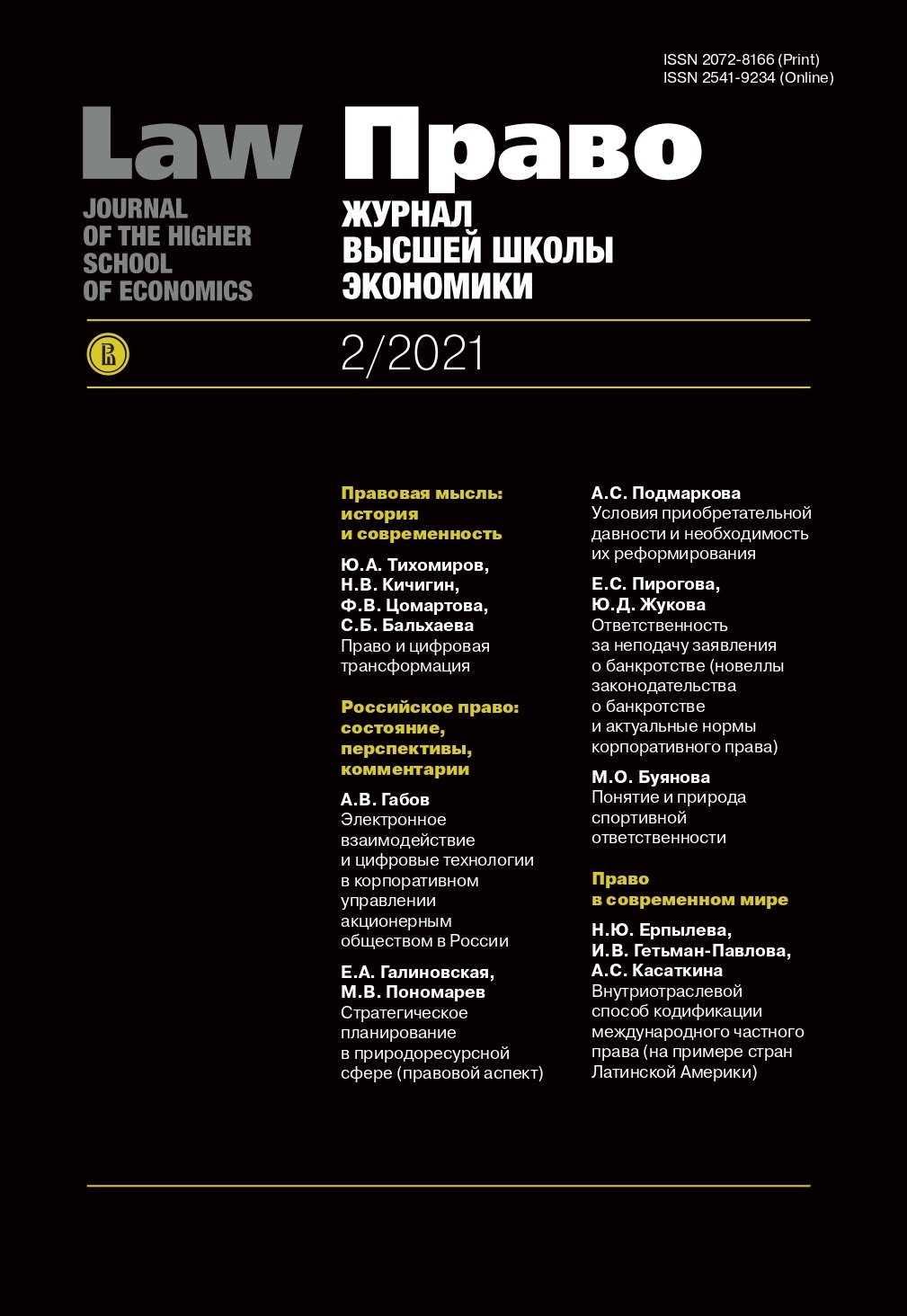Damages Recovery Claims Regulation in Civil Code of RF and in Principles of European Contractand Tort Law
Abstract
Liability constitutes a key concept of the Civil Law science. Its universal implication lies in the monetization of another person's negative property consequences and the assignment of its financial results to the complicit party. In the present paper the evolution of the said legal institution is reviewed. At the dawn of our civilization the liability manifested a response to a non-compliance with prescriptions of law and represented a fine to be paid in a multiple amount of the loss. As our society progressed, we started classifying the monetary repressions into civil and criminal liability, into liability acting as a response to personal affronts and liability for failure to perform contractual or non-contractual property obligations. At the same time penalty failed to restore one's financial position in some cases and, conversely, allowed for abuse of rights. Another way of legal protection became widely adopted — damages for losses. The concept of loss of profit was also accepted into widespread professional use as an important component of damages. The Russian Civil Code provided for the development of the said instrument, as it was defined as “future losses for the restoration of the violated right”. Unfortunately, at the present time it does not find a widespread application among litigants. Judges also fail to comprehend such a broad understanding of possible damages. The comparison between the traditional and modern concepts regarding this issue found its reflection in the corresponding chapter. The structure of gross domestic product (GDP) with prevailing services sector is the economic parameter of the post-industrial society and its fundamental attribute. The civil liability of service producers is of a much stricter nature. For instance, they are forced to pay damages for a rightful unilateral repudiation of the contract, no matter customers are citizens or not, whereas the legal tradition prescribes to pay damages only if the party acted in breach of law. In the present work the author draws a conclusion on the increasing importance of damages and their new role.
References
Baybak V.V. (2014) Causal relationship as a condition of contractual liability: comparative legal sketch. Vestnik Vysshego arbirazhnogo suda, no 6, pp. 4-21 (in Russian)
Baybak V.V. (2015) Loss of a chance as a type of contractual losses. Vestnik ekonomicheskogo pravosudia, no 5, pp. 63-73 (in Russian)
Benjamin P. (1960). Penalties, Liquidated Damages and Penal Clauses in Commercial Contract: A Comparative Study of English and Continental Law. International & Comparative Law Quarterly, issue 4, pp. 600-627.
Burrows A. (2017) Oxford Principles of English Law: English Private Law, A. Burrows, D. Feldman (eds.). 3rd ed. Oxford: University Press. 3104 p.
European Group on Tort Law (2005) Principles of European Tort Law: Text and Commentary. Vienna: Verlag Österreich. 282 p.
Egorov A.V., Usacheva K.A. (2013) Subsidiary liability for bringing to bankruptcy — an unsuccessful equivalent of the Western doctrine of lifting the corporate cover. Vestnik Vyssgegi arbitrazhnogo suda no 12, pp. 6-61 (in Russian)
Gutnikov O.V. (2016) Subsidiary liability in the legislation on legal entities: the need for reforms. Advokat, no 9, pp. 5-13 (in Russian)
Hesselink M. (2001) The Principles of European Contract Law: Some Choices Made by the Lando Commission. Global Jurist Frontiers, no 1, art. 4, pp. 5-95.
Komarov A. (2008) The Limitation of Contract Damages in Domestic Legal Systems and International Instruments. Contract Damages: Domestic and International Perspectives. D. Saidov and R. Cunnington (eds.). Oxford: Bloomsbury Publishing, pp. 245-264.
Koziol H. (2017) Harmonization and fundamental issues of European tort law (beginning). Vestnik grazhdanskogo prava, no 5, pp. 173-228 (in Russian)
Michaels R. (2014) The UNIDROIT Principles as Global Background Law. Available at: URL: https://ssrn.com/abstract=2502899 (accessed: 12.02.2020)
Nicholas B. (1992) The French Law of Contract. 2nd ed. Oxford: Clarendon. 292 p.
Perillo J. (1994) Unidroit Principles of International Commercial Contracts: the black letter text and a review. Fordham Law Review, no 2, pp. 281-344.
Sadikov O.N. (2009) Losses in the civil law of the Russian Federation. Moscow: Statut, 226 p. (in Russian)
Sadikov O.N. (2016) Model rules of European private law. Actual aspects of modern practice of international commercial turnover: collection of papers. Moscow: Statut, pp. 200-211 (in Russian)
Serakov V.V. (2016) Comparative legal analysis of the foreseeability of losses as a way to limit the amount of damage caused. Vestnik grazhdanskogo prava, no 4, pp. 159-184 (in Russian)
Copyright (c) 2021 Law Journal of the Higher School of Economics

This work is licensed under a Creative Commons Attribution-ShareAlike 4.0 International License.


















